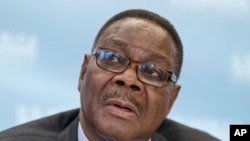Malawi President Peter Mutharika says there should be transparency in the selection of the next United Nations Secretary General as Ban ki Moon’s second term enters its final lap.
Mr. Mutharika stressed in an exclusive interview with the VOA on the need to reform and restructure the UN, especially the Security Council, to ensure Africa is represented in the key decision-making structure which has China, Russia, United Kingdom, United States and France as permanent members.
As a result, said Mr. Mutharika, the selection of the UN Secretary General becomes a cause for concern.
“Everything, including for example, there was an issue of the Secretary General, people were saying we need more transparency and democracy in the selection of the Secretary General because in the end, while the General Assembly is supposed to vote, but in the end it’s as if it’s the 5 powers that agree on who should be the Secretary General…so they think a system like that is no longer tenable,” said the Malawian President.
African leaders, he said, feel that the continent’s views should be taken into account regarding many issues concerning the UN, including the electoral process for a new UN chief.
Latin American and Caribbean leaders have also called for the reform of UN bodies.
BAN KI-MOON TERM
Mr. Ban's expected to retire in December 2016. Although the UN Charter does not explicitly forbid a third term, no Secretary General has ever done so.
Because Mr. Ban is not believed to be seeking an unprecedented third term, an election would be held sometime next year to seek his replacement.
The former South Korean Foreign Minister was the only candidate after the UN Security Council unanimously recommended his re-election after taking over from Ghanaian Kofi Atta Annan in 2007.
The United Nations Security Council recommended Annan to replace the previous secretary-general, Dr. Boutros Boutros-Ghali of Egypt, in later 1996. The General Assembly voted in his favor, and he began his first term as secretary-general on January 1, 1997.
SUSTAINABLE DEVELOPMENT GOALS
At the same time Mr. Mutharika expressed confidence in the ability of developing nations to meet the new Sustainable Development Goals adopted at the just-ended 70th Session of the United Nations General Assembly in New York.
He’s confident that most of the goals will be met come 2030.
Mr. Mutharika thinks the SDGs will fare better than the Millennium Development Goals that expired this year with most developing nations failing to attain all of them.
“I think the problem with the MDG’s (is that they) were based on an assumption which probably was not realistic, for example we talked about universal primary education, but did not think about how we are going to have school buildings, teachers, teaching materials, learning materials so we ended up having all these kids registered but there are no school buildings or blocks,” he said.
“The same with health for example, we talked about all this, but we forgot that we needed hospitals, we need nurses, we needed doctors, we need equipment, and we needed drugs. So, that was ignored; the whole supply side. I am hoping that with the SDG’s it will be a different approach, especially in terms of resources and how the resources will be mobilized…I think some of them will be met… everyone is determined.”
The Sustainable Development Goals were adopted by the UN at the United Nationals General Assembly Summit in September.
They set the vision for member nations to end poverty, hunger, inequality and tackle climate change, among other issues. The target year for the goals is 2030.
Mr. Ban summarized the need to achieve the 17 goals for 2030 saying: “The true test of commitment to Agenda 2030 will be implementation. We need action from everyone, everywhere. Seventeen Sustainable Development Goals are our guide. They are a to-do list for people and planet, and a blueprint for success.”
The SDGs replace the United Nation’s previous blueprint, the Millennium Development Goals that were adopted in 2000 and expired this year.




